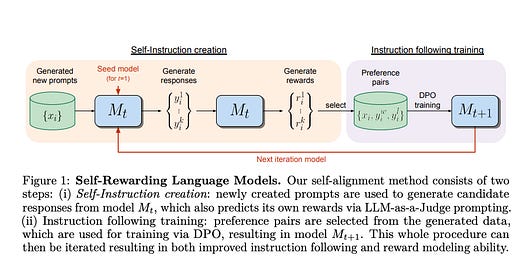Daily Papers
1.Self-Rewarding Language Models( paper )
We posit that to achieve superhuman agents, future models require superhuman feedback in order to provide an adequate training signal. Current approaches commonly train reward models from human preferences, which may then be bottlenecked by human performance level, and secondly these separate frozen reward models cannot then learn to improve during LLM training. In this work, we study Self-Rewarding Language Models, where the language model itself is used via LLM-as-a-Judge prompting to provide its own rewards during training. We show that during Iterative DPO training that not only does instruction following ability improve, but also the ability to provide high-quality rewards to itself. Fine-tuning Llama 2 70B on three iterations of our approach yields a model that outperforms many existing systems on the AlpacaEval 2.0 leaderboard, including Claude 2, Gemini Pro, and GPT-4 0613. While only a preliminary study, this work opens the door to the possibility of models that can continually improve in both axes.
2.DiffusionGPT: LLM-Driven Text-to-Image Generation System ( paper | webpage)
Diffusion models have opened up new avenues for the field of image generation, resulting in the proliferation of high-quality models shared on open-source platforms. However, a major challenge persists in current text-to-image systems are often unable to handle diverse inputs, or are limited to single model results. Current unified attempts often fall into two orthogonal aspects: i) parse Diverse Prompts in input stage; ii) activate expert model to output. To combine the best of both worlds, we propose DiffusionGPT, which leverages Large Language Models (LLM) to offer a unified generation system capable of seamlessly accommodating various types of prompts and integrating domain-expert models. DiffusionGPT constructs domain-specific Trees for various generative models based on prior knowledge. When provided with an input, the LLM parses the prompt and employs the Trees-of-Thought to guide the selection of an appropriate model, thereby relaxing input constraints and ensuring exceptional performance across diverse domains. Moreover, we introduce Advantage Databases, where the Tree-of-Thought is enriched with human feedback, aligning the model selection process with human preferences. Through extensive experiments and comparisons, we demonstrate the effectiveness of DiffusionGPT, showcasing its potential for pushing the boundaries of image synthesis in diverse domains.
3.Code Generation with AlphaCodium: From Prompt Engineering to Flow Engineering ( paper | code )
Code generation problems differ from common natural language problems - they require matching the exact syntax of the target language, identifying happy paths and edge cases, paying attention to numerous small details in the problem spec, and addressing other code-specific issues and requirements. Hence, many of the optimizations and tricks that have been successful in natural language generation may not be effective for code tasks. In this work, we propose a new approach to code generation by LLMs, which we call AlphaCodium - a test-based, multi-stage, code-oriented iterative flow, that improves the performances of LLMs on code problems. We tested AlphaCodium on a challenging code generation dataset called CodeContests, which includes competitive programming problems from platforms such as Codeforces. The proposed flow consistently and significantly improves results. On the validation set, for example, GPT-4 accuracy (pass@5) increased from 19% with a single well-designed direct prompt to 44% with the AlphaCodium flow. Many of the principles and best practices acquired in this work, we believe, are broadly applicable to general code generation tasks.
4.ChatQA: Building GPT-4 Level Conversational QA Models ( paper )
5.WorldDreamer: Towards General World Models for Video Generation via Predicting Masked Tokens ( paper | webpage )
AI News
1.Mark Zuckerberg’s new goal is creating artificial general intelligence ( link )
2.ChatGPT effect: Coursera sees signups for AI courses every minute in 2023( link )
3.Creating an engaging AI-Powered Game using Unity and Hugging Face ( link )
AI Repos
1.Vlogger:Make Your Dream A Vlog( repo )
2.OMG-Seg: Is One Model Good Enough For All Segmentation? ( repo )
3.Painless Inference Acceleration (PIA) ( repo )






